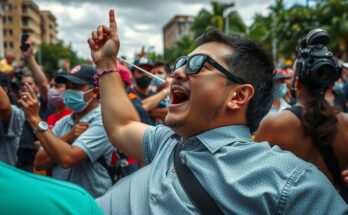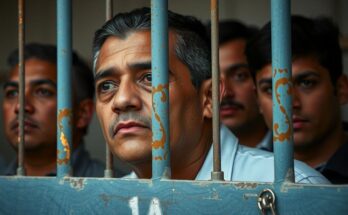Incumbent President Kais Saied is expected to win the presidential election in Tunisia with 89.2 percent of the vote according to exit polls, despite low turnout rates. His re-election raises concerns about authoritarianism in a country that was once viewed as a model of democracy following the Arab Spring. The election faced criticism for the barring of opposition candidates and low voter participation, prompting fears of electoral legitimacy.
Tunisia’s incumbent President Kais Saied is projected to achieve a significant victory in the presidential election, receiving 89.2 percent of the vote based on exit polls released on Sunday, despite a notably low voter turnout. This anticipated win comes in the backdrop of an election that has raised serious concerns among human rights organizations regarding the future of democracy in Tunisia, a nation that once symbolized progress during the Arab Spring uprisings. At 66 years of age, President Saied is expected to defeat his rivals decisively, with imprisoned opponent Ayachi Zammel anticipated to receive about 6.9 percent of the votes and Zouhair Maghzaoui expected to garner 3.9 percent, according to Sigma Conseil, an independent polling body. Critics argue that Saied’s re-election, three years after he assumed extraordinary powers, will solidify an already established authoritarian regime. Following the removal of long-time dictator Zine El Abidine Ben Ali in 2011, Tunisia emerged as a beacon of hope for democracy in the region; however, Saied’s rise to power in 2019 marked a drastic shift in this trajectory. The Independent High Authority for Elections (ISIE) indicated that nearly 9.7 million citizens were eligible to vote, representing a population of roughly 12 million, yet only 27.7 percent participated in the electoral process – the lowest turnout recorded since the country’s revolution. Political commentator Hatem Nafti noted, “The vote’s legitimacy is undoubtedly tainted with candidates who could have overshadowed (Saied) being systematically sidelined.” The authority barred fourteen candidates, ostensibly for lacking sufficient endorsements, further diminishing the election’s credibility. Speaking from his campaign office, President Saied cautioned against “foreign interference” while pledging to eradicate corruption and enhance national governance. Following the announcement of exit polls, numerous supporters celebrated in the streets, expressing confidence in Saied’s policies. However, critiques of electoral integrity were prevalent, especially concerning the disallowance of domestic watchdogs from monitoring the election. Notably, Saied’s administration has faced accusations of suppressing dissent, with over 170 individuals currently incarcerated for political reasons, including opposition figures like Zammel and Rached Ghannouchi, leader of the Ennahdha party. A significant portion of the populace is skeptical about the implications of a Saied victory for Tunisia’s socioeconomic conditions and democratic framework, with many fearing a continuation of authoritarian practices. In a recent address, Saied emphasized the need for substantial public participation in the electoral process, framing it as crucial to national recovery amidst accusations of conspiracy against his administration. Amidst these developments, Tunisia finds itself at a critical junction, where the legacy of its revolutionary past collides with present-day political realities.
Tunisia stands as a historical reference point in the Arab Spring, demonstrating the potential for democratic governance following the ousting of a dictator. In 2011, the country experienced a period of hope and reform, establishing itself as a leader in the region’s push for democratic change. However, the political landscape altered significantly following Kais Saied’s election in 2019, especially after he consolidated his powers through a controversial maneuver that critics regard as a coup. His rule has been characterized by steps that many observers view as increasingly authoritarian, including constitutional revisions and the suppression of opposition parties. These developments contribute to ongoing debates about the state of democracy in Tunisia and the legitimacy of electoral processes under Saied’s administration.
In conclusion, President Kais Saied is projected to secure a decisive victory in the upcoming election, reflecting a consolidation of power that raises profound concerns regarding the state of democracy in Tunisia. Despite the historical context of Tunisia as a progressive nation in the Arab Spring, the current political climate suggests an entrenchment of authoritarianism, exemplified by significant voter apathy and dissent suppression. As the nation prepares for the preliminary results and the potential implications of Saied’s continued presidency, questions about the future of democracy and social justice remain prevalent and unresolved.
Original Source: www.france24.com




